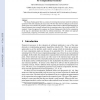Free Online Productivity Tools
i2Speak
i2Symbol
i2OCR
iTex2Img
iWeb2Print
iWeb2Shot
i2Type
iPdf2Split
iPdf2Merge
i2Bopomofo
i2Arabic
i2Style
i2Image
i2PDF
iLatex2Rtf
Sci2ools
109
click to vote
COMPGEOM
1998
ACM
1998
ACM
Interval Arithmetic Yields Efficient Dynamic Filters for Computational Geometry
We discuss floating-point filters as a means of restricting the precision needed for arithmetic operations while still computing the exact result. We show that interval techniques can be used to speed up the exact evaluation of geometric predicates and describe an efficient implementation of interval arithmetic that is strongly influenced by the rounding modes of the widely used IEEE 754 standard. Using this approach we engineer an efficient floating-point filter for the computation of the sign of a determinant that works for arbitrary dimensions. We validate our approach experimentally, comparing it with other static, dynamic and semi-static filters.
COMPGEOM 1998 | Discrete Geometry | Efficient Floating-point Filter | Floating-point Filter | IEEE 754 Standard |
| Added | 11 Aug 2010 |
| Updated | 11 Aug 2010 |
| Type | Conference |
| Year | 1998 |
| Where | COMPGEOM |
| Authors | Hervé Brönnimann, Christoph Burnikel, Sylvain Pion |
Comments (0)

